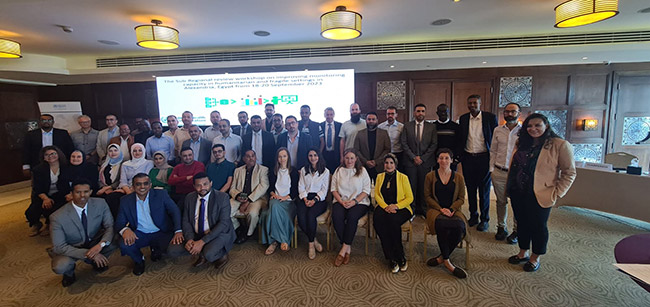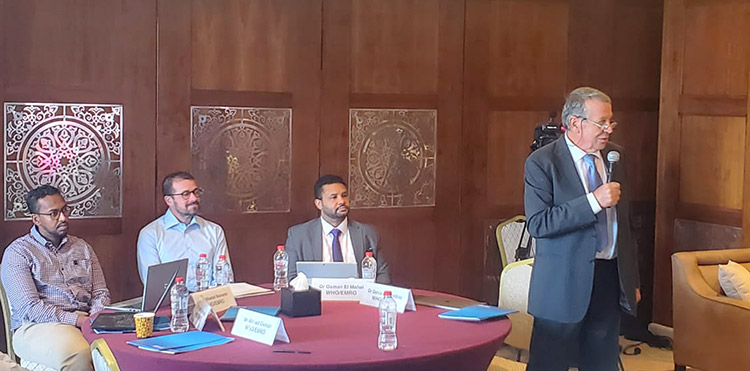 Participants during the workshop. Photo credit: WHO/Health Emergency Information and Risk Assessment Unit
Participants during the workshop. Photo credit: WHO/Health Emergency Information and Risk Assessment Unit
Cairo, 19 October 2023 – The WHO Regional Office for the Eastern Mediterranean ran a workshop in Alexandria governorate, Egypt, in September 2023 to review implementation of a project, Improving monitoring capacity in humanitarian and fragile settings in the Eastern Mediterranean Region of WHO. The 3-day workshop on this capacity-building project involved WHO office staff and ministry of health focal points from 4 countries and territories. Various WHO headquarters and Regional Office personnel also attended.
The occupied Palestinian territory, Somalia, Syria and Yemen were selected to take part in the project’s pilot phase, owing to the unique challenges they face in response monitoring. These include the fragmented nature of data collection efforts, which has in the past led to inconsistencies in methodologies and indicators. This has made it difficult to compare and analyse data across response efforts and countries/territories, and potentially hinders overall data quality.
The workshop served as a critical review of the project, which was initiated in 2022 to tackle and address the challenges in response monitoring in humanitarian and fragile settings specifically, and strengthen response monitoring and evaluation mechanisms. The project will also provide decision-makers with reliable information to steer efficient and effective response measures.
Representatives of other countries, including from outside the Region, also took part in the workshop to explore the project’s potential replication. South Sudan and Ukraine were among those represented.
 Participants listen to a colleague speak during the workshop. Photo credit: WHO/Health Emergency Information and Risk Assessment Unit
Participants listen to a colleague speak during the workshop. Photo credit: WHO/Health Emergency Information and Risk Assessment Unit
Workshop participants engaged in in-depth discussions on various aspects and challenges related to the project. They reviewed the results of the pilot’s assessment phase, which focused on the feasibility of key performance indicators at the country level; country/territory capacities; and existing health information systems. Participants also explored the project’s links to decision-making on emergency response.
Through the workshop, costed action plans were finalized to roll out the project in the 4 countries and territories. This has put them on track to operationalize the project and generate positive change in their response efforts.
The plans further include various actions that will address fragmented data collection; the absence of standardized indicators; inconsistent methodologies; and irregularities of data analysis and data use for action. Moreover, the plans include actions to strengthen data sources, capacity-building and data quality and to promote data sharing and collaboration. These actions will help the 4 countries and territories to effectively improve their response monitoring capacity.
The success of this pilot phase lays the groundwork for the project’s potential expansion to other WHO regions. The lessons learned and best practices identified during the review workshop can be applied to strengthen response monitoring capacity in humanitarian and fragile settings around the world.





